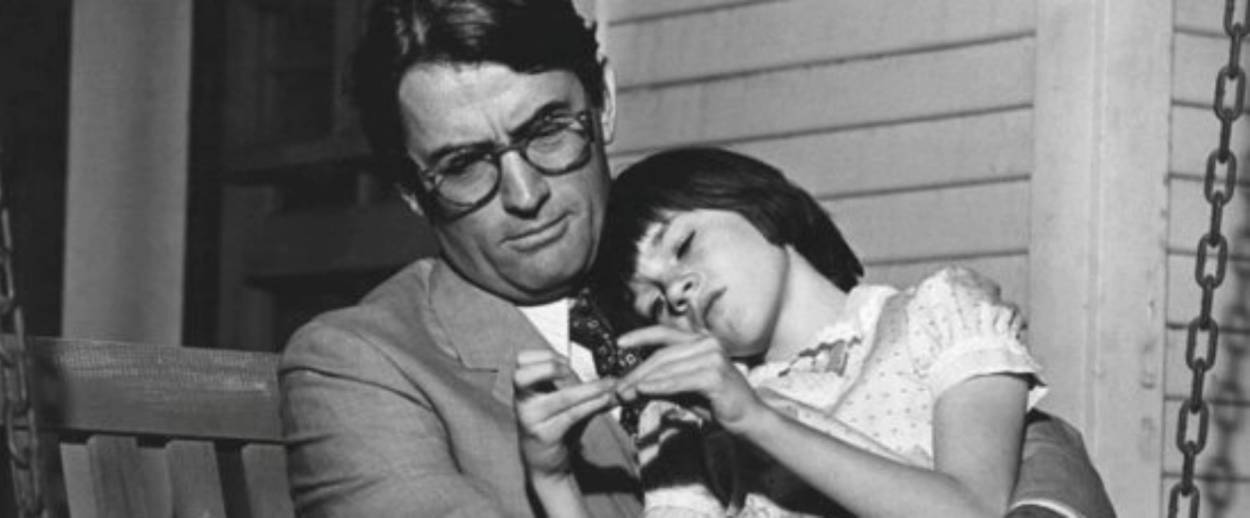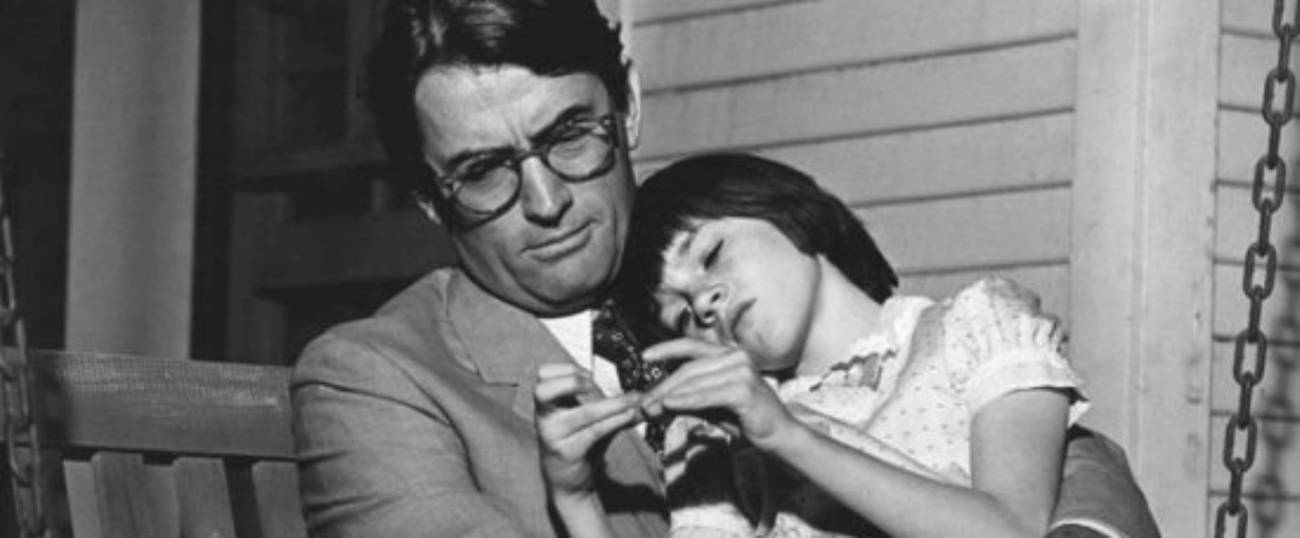Atticus and Scout, My Father and Me
Harper Lee’s Go Set a Watchman helped me reflect on my Jewish upbringing in the 1950s South, and to understand that our childhood heroes are not perfect adults.




Readers of Harper Lee’s recently published novel, Go Set a Watchman, have had to confront their disappointment when they meet an Atticus Finch—the stalwart moral hero of Lee 1960 classic To Kill a Mockingbird—so at odds with their previous vision. Of course, Atticus Finch is nothing more than a fictional personage, yet he is a vital character of historic influence to whom tens of millions of readers feel a personal connection.
By presenting a very human portrait of a flawed Atticus in Go Set a Watchman, Harper Lee has destabilized the view many of these people have of the heroically decent protagonist of To Kill a Mockingbird. In so doing, Lee has clouded, if not destroyed, the very terra firma of inspiration upon which their lives have been constructed. The enormity of commentary and criticism surrounding the character of Atticus that has emerged since the publication of Lee’s second novel, which portrays his adult daughter’s homecoming as her hometown of Maycomb, Alabama, faces desegregation in the 1950s, lays naked the distinction between what it is to view the world as an adult—with an acknowledgement of the hues of grey that mark our remembrances of things past—and what it means to regard the world as a child, when memory and vision are unclouded and pristine.
The discrepancy between the nuanced characterizations that Jean Louise “Scout” Finch provides of her father Atticus in Go Set a Watchman, when she witnesses him presiding at a meeting of one of scores of racist White Citizens Councils that proliferated throughout the South during the 1950s, stand in sharp contrast to the completely heroic descriptions she provides of him in To Kill a Mockingbird. The goodness and justice she believed her father embodied and that anchored her place in the world are now called into question. The malleability of her view of her childhood past is almost too much for her to bear. Scout breaks from her father and the world that formed her even as she is able to regard them at the end with some generosity.
As I read the pages of Go Set a Watchman, I identified on many levels with Scout. Like her, I now live in New York City and, although I am decades younger, I too grew up in the South—specifically, Newport News, Virginia, during the 1950s and 1960s. But there are differences, as well. As traditional Jews, my family was not a venerable Protestant one like the Finches and we did not participate as Protestants firmly anchored in the soil of the larger gentile world that surrounded us. Instead, my world was in significant measure a Jewish one. My family had come to Tidewater, Virginia, from Eastern Europe during the 1910s; therefore, how I experienced the epic events and complicated attitudes of those tumultuous days were dissimilar from the manner in which the fictional Scout reacted to them.
To be sure, the South I experienced was far removed from the fears and stereotypes Northern Jews often have of the South. I was and am a Virginian. I was formed in the South and partook of its heritage and manners. I was a page in the Virginia State Senate and president of the student body at Newport News High School. Later I attended both The College of William and Mary and the University of Virginia. However, as a Jew I was not of it. For me, Virginia was—and remains—a place of intimacy. It is equally a place of alienation. Part of me felt I never really belonged because of my Jewishness. In Go Set a Watchman, Scout only discovered this as an adult when her memory of her childhood was shattered by the racist actions and attitudes of her father.
The politics of race was the central issue in the Virginia of my boyhood just as it was for Scout in Alabama: there was strict segregation in the schools and public facilities that were brandished with ubiquitous signs separating “white” from “colored” people. While the landmark 1954 Brown v. Topeka decision in which the U.S. Supreme Court reversed Plessey v. Ferguson (1896) and held that the doctrine of “separate, but equal” was unconstitutional, Virginia Senator Harry Flood Byrd of Winchester—the dominant political voice in Virginia during those years—formulated a policy of “massive resistance” to integration that guided the political direction of the Commonwealth during those years.
Politics was a staple part of our family’s conversations, and my father, like virtually every other Jew in my hometown, was strongly opposed to the segregationist policies advocated by Senator Byrd and his followers. Governor Lindsay Almond, who courageously opposed Senator Byrd and abandoned his policy of “massive resistance” to integration, was a hero in my household. My father would never have participated in a Citizens Council, and when I once related at a family dinner that we had learned about Senator John C. Calhoun of South Carolina and his doctrine of “Nullification” whereby each State had the right to nullify the edicts of the Federal Government, my father smiled and stated wryly, “Some people here seem to be unaware a war was fought and that doctrine lost.”
During this period of my boyhood, my father took me to a segregationist rally being held in the southern countryside of Virginia. He was uncharacteristically silent as we drove to the rally. He said only that he wanted me to see how “evil” appeared. My father made no other comment, either at the rally or as we drove home, yet he succeeded in his pedagogic aim: More than fifty years later the event is seared in my soul.
However, as I relate this story and describe this period, I also know that my father did not speak out forcefully against segregation in the public arena. He was surely not an outspoken political activist. While every external sign marked us as members of the White majority, I am certain his own insecurity as a Jew left him feeling vulnerable and he was cautious about what he would say about the issues of race outside of our home and the Jewish community.
I do not know precisely what the motivations were that caused Harper Lee to publish Go Set a Watchman at this point as she enters her final years of life. However, in offering us the portrait she does of Atticus in her current novel, Lee provides us, perhaps unintentionally, with a powerful lesson as she holds up a mirror to all of us to reflect on what it means to view the world through the prism of adulthood. And as I reflect mine, Lee enables me to see that my father and the Jews of that time and place were not heroes caste in the image of Atticus in To Kill a Mockingbird, even as she permits me to be grateful that I need not face the burden that Scout did when she confronted the overt racism of her father and her community in Go Set a Watchman.
Part of me wishes that were not so. I wish my father and my community were perfect. After all, like everyone who is heartbroken by Atticus Finch being a man of his time and place, I have a childlike yearning for a world divided clearly and absolutely between good and evil. I would like to view my father and the Jews of the South through a heroic prism alone. I would like Atticus Finch, fictional though he may be, to remain unsullied.
However, people and places are fashioned from far more complexity, and life is never simple. I was shaped by a social structure based on racial injustice even as I also felt a degree of alienation from it as a Jew. The place and people who formed me were imperfect and considerably removed from an absolutely just world guided by morally perfect leaders.
As an adult, I am thankful to Harper Lee for writing a book about what it means to realize our homes are flawed, our heroes imperfect. She teaches me that even when persons and the worlds they create are all too human and deficient, that does not make them devoid of goodness and virtue. There is a lesson of dissatisfaction and acceptance here for us all.
Related: Harper Lee’s ‘Watchman’ Undoes the Hypocritical Fantasies of Benevolent White Power in ‘Mockingbird’
Rabbi David Ellenson served as President of Hebrew Union College-Jewish Institute of Religion from 2001-2013. He is currently Chancellor-Emeritus of HUC-JIR and Director of the Schusterman Center for Israel Studies at Brandeis University.